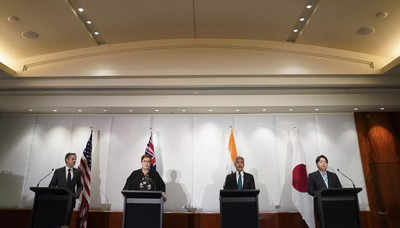- News
- India News
- India doesn’t follow national sanctions: Jaishankar on Myanmar at Quad meet
Trending
This story is from February 12, 2022
India doesn’t follow national sanctions: Jaishankar on Myanmar at Quad meet

US secretary of state Antony Blinken (from left), Australian foreign minister Marise Payne, Indian FM Subrahmanyam Jaishankar and their Japanese counterpart Yoshimasa Hayashi hold a joint press availability at the Quad meeting of foreign ministers in Melbourne, Australia, on Friday. (AP)
NEW DELHI: As the United States, the United Kingdom and Canada work towards ensuring ``accountability’’ for the military coup in Myanmar by imposing fresh sanctions on more local officials, India Friday said it didn’t follow the policy of ``national sanctions’’. The assertion by foreign minister S Jaishankar came in the presence of US secretary of state Antony Blinken in the joint Quad press conference in Melbourne.
India, in fact, has always maintained that it doesn’t accept unilateral sanctions that individual countries seek to impose and that it adheres only to UN sanctions. India’s Myanmar policy has also been guided by the need to tackle insurgency along the border it shares with the country and also China’s expanding influence in the region.
While Blinken described the developments in Myanmar as deeply troubling and accused the junta of doubling down on repression and violence, Jaishankar said India’s policy was guided by very specific concerns that included the presence of insurgents along the border.
"I think we are all agreed on the importance of the democratic transition which was underway in Myanmar. That the country has moved in a different direction is something which troubles all of us. We all very strongly back the ASEAN position on Myanmar and their efforts to engage," said the foreign minister.
The Quad joint statement said the countries remained ``gravely’’ concerned about the crisis in Myanmar and call for an end to violence, release of all those arbitrarily detained, including foreigners, and unhindered humanitarian access. ``We reaffirm our support for ASEAN efforts to seek a solution in Myanmar and call on the military regime to urgently implement ASEAN’s Five-Point Consensus and swiftly return on the path of democracy. We encourage the international community to work together to support an end to the violence,’’ it said.
Significantly, another Quad member, Australia, refused to further sanction Myanmar on the first anniversary of the coup saying it was unlikely to support efforts to find an ASEAN-led solution for the situation in Myanmar.

India, in fact, has always maintained that it doesn’t accept unilateral sanctions that individual countries seek to impose and that it adheres only to UN sanctions. India’s Myanmar policy has also been guided by the need to tackle insurgency along the border it shares with the country and also China’s expanding influence in the region.
While Blinken described the developments in Myanmar as deeply troubling and accused the junta of doubling down on repression and violence, Jaishankar said India’s policy was guided by very specific concerns that included the presence of insurgents along the border.
"I think we are all agreed on the importance of the democratic transition which was underway in Myanmar. That the country has moved in a different direction is something which troubles all of us. We all very strongly back the ASEAN position on Myanmar and their efforts to engage," said the foreign minister.
"But we are concerned as an immediate land-border neighbour. We have some very specific concerns on Myanmar, which also guides our thinking. Concerns about insurgents operating there who some months ago killed a very senior military officer and his family, concerns about Covid and the lack of vaccination on our common border and also about a humanitarian situation, which is arising from food shortages. As far as we are concerned, we don’t follow a policy of national sanctions,’’ he added.
The Quad joint statement said the countries remained ``gravely’’ concerned about the crisis in Myanmar and call for an end to violence, release of all those arbitrarily detained, including foreigners, and unhindered humanitarian access. ``We reaffirm our support for ASEAN efforts to seek a solution in Myanmar and call on the military regime to urgently implement ASEAN’s Five-Point Consensus and swiftly return on the path of democracy. We encourage the international community to work together to support an end to the violence,’’ it said.
Significantly, another Quad member, Australia, refused to further sanction Myanmar on the first anniversary of the coup saying it was unlikely to support efforts to find an ASEAN-led solution for the situation in Myanmar.
End of Article
FOLLOW US ON SOCIAL MEDIA










